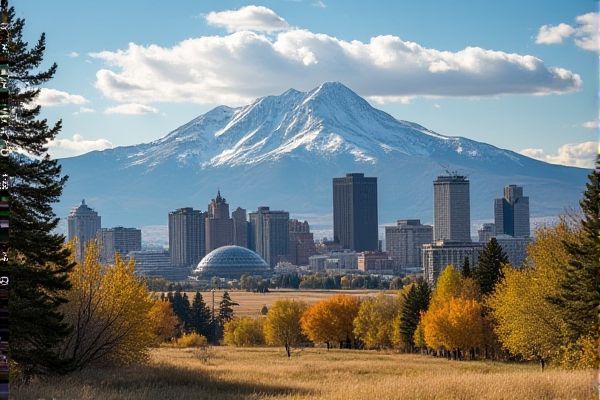
Insights from Colorado residents and expatriate communities: Weather variability: prepare for all seasons. High altitude: acclimate gradually. Outdoor lifestyle: numerous recreational activities. Cost of living: varies by region. Job market: tech and tourism dominate. Marijuana laws: know regulations. Diverse culture: welcoming communities. Transportation: winter driving challenges. Wildlife: encounter precautions advised. Sustainable living: eco-friendly initiatives supported.
Weather variability: prepare for all seasons.
Colorado residents and expatriates need to prepare for significant weather variability across all seasons, including hot summers with low humidity, mild falls with rain and cool temperatures, winters with snow and temperatures ranging from 15 to 50 degrees, and springs marked by a mix of rain, snow, and hail with temperatures between 25 and 65 degrees. For more detailed insights into how to adapt to this ever-changing climate, you can visit the Colorado Living Blog, which provides guidance on navigating these diverse weather patterns.
High altitude: acclimate gradually.
To effectively acclimate to high altitude, it's crucial to ascend gradually, limiting increases in sleeping elevation to no more than 1,600 feet per day once above 9,000 feet, and planning an extra day for acclimation every 3,300 feet. Colorado residents and visitors are encouraged to spend initial days at lower altitudes, maintaining hydration by drinking twice the usual amount of water, and avoiding alcohol and caffeine to ensure a smooth acclimatization process. Additionally, engaging in mild exercise is beneficial in preventing altitude sickness. For more comprehensive insights, the CDC advises on limiting immediate ascents to altitudes over 9,000 feet in a day to mitigate the risks of acute mountain sickness and other related conditions.
Outdoor lifestyle: numerous recreational activities.
Colorado residents and expatriates can enjoy a rich outdoor lifestyle with numerous recreational activities, including hiking, biking, fishing, boating, and more, across the state's many parks, trails, and waterways. The Denver suburbs offer a balance of outdoor activities and urban living, with areas like Highlands Ranch, Broomfield, and Littleton providing extensive parks, trails, and open spaces for hiking, biking, and other outdoor pursuits while being close to city amenities. For more information on these activities, visit the Colorado Parks and Wildlife website.
Cost of living: varies by region.
The cost of living in Colorado varies significantly by region, with housing costs 20% higher than the national average, while utilities are 9% lower. Cities like Denver, Westminster, and Colorado Springs have higher costs, especially in housing, whereas places like Grand Junction and Gunnison are more affordable. For more detailed insights, visit the Cost of Living Calculator to compare expenses in different areas across the state.
Job market: tech and tourism dominate.
In 2024, Colorado's job market is expected to be driven by strong growth in the tech sector, with high demand for roles in software development, data analytics, and cybersecurity. In addition to the tech boom, there is also an anticipated rebound in the tourism industry. Record-breaking visitor numbers and spending are set to increase job opportunities in hospitality and service sectors, presenting a significant development in the state's economic landscape. For more insights on these trends, visit the article on Colorado Job Market Trends, which offers a comprehensive overview of what to expect in 2024.
Marijuana laws: know regulations.
In Colorado, adults 21 and older can legally possess, use, and grow limited amounts of marijuana, with specific regulations on possession limits (up to one ounce), cultivation (up to six plants), and consumption (not in public places). Local governments cannot limit individual rights to possess, grow, and use marijuana, but businesses require licenses and must follow strict rules to avoid penalties. For more detailed information on these regulations, you can visit the official Marijuana Laws website. Understanding these laws ensures compliance and helps foster a safe and legal environment for all community members.
Diverse culture: welcoming communities.
Colorado's diverse culture is characterized by a significant immigrant population, with one in ten residents being immigrants, who contribute extensively to the state's economy, labor force, and cultural richness, making Colorado a welcoming and inclusive community. Denver celebrates its multicultural diversity through various ethnic events, festivals, and vibrant neighborhoods, reflecting a city that is a gathering place for people of many cultures, fostering a sense of belonging and inclusivity. To learn more about the contributions and impact of immigrants in the region, visit the American Immigration Council. By embracing diversity, both Colorado and Denver showcase their commitment to fostering harmonious and thriving communities.
Transportation: winter driving challenges.
Colorado residents face significant winter driving challenges, which include the necessity to drive slower, maintain a safe distance, and be prepared for treacherous road conditions. This is especially important in mountainous areas where accidents are more common due to steep inclines and icy roads. Moreover, newcomers to Colorado must adapt to local winter driving conditions by reducing speed, maintaining distance, and anticipating icy spots. It is also crucial to comply with the state's snow tire and traction laws, which are strictly enforced on highways and mountain passes. For more comprehensive guidance, it is helpful to explore tips for Snow and Ice Driving in Colorado to ensure safety and preparedness during the colder months.
Wildlife: encounter precautions advised.
To ensure safety during wildlife encounters, Colorado residents are advised to recreate during daylight hours, travel in groups, keep children close, and be alert to their surroundings. They should also maintain a safe distance, avoid direct eye contact, and never feed or approach wildlife. Specific guidelines for encounters with bears, moose, and mountain lions are available on the Crossing Paths With Wildlife website. By following these practices, individuals can help protect both themselves and the diverse wildlife inhabiting the area.
Sustainable living: eco-friendly initiatives supported.
The Colorado Green Business Network supports sustainable living by providing free coaching and assistance to organizations to increase efficiency and sustainability. It recognizes and awards exemplary practices while connecting like-minded businesses across the state to reduce resources such as emissions, water, waste, energy, and more. For more information, you can visit the Colorado Green Business Network website.
